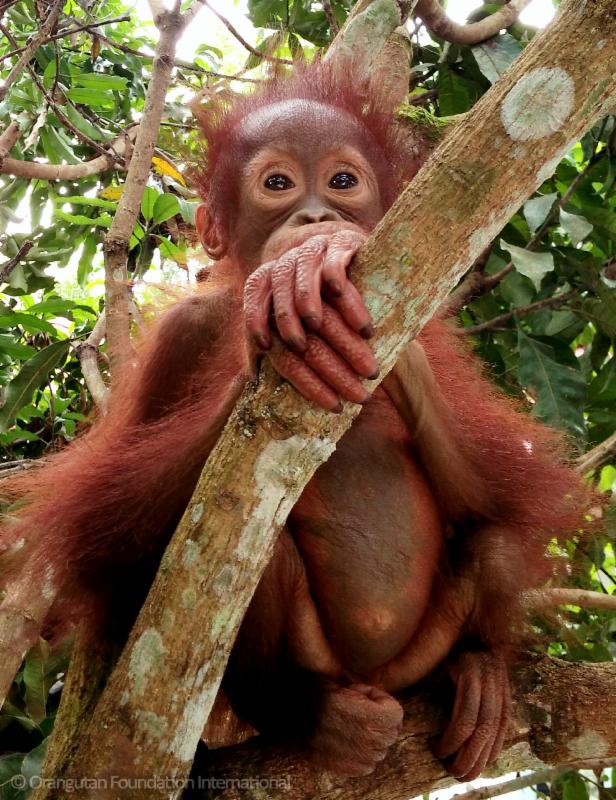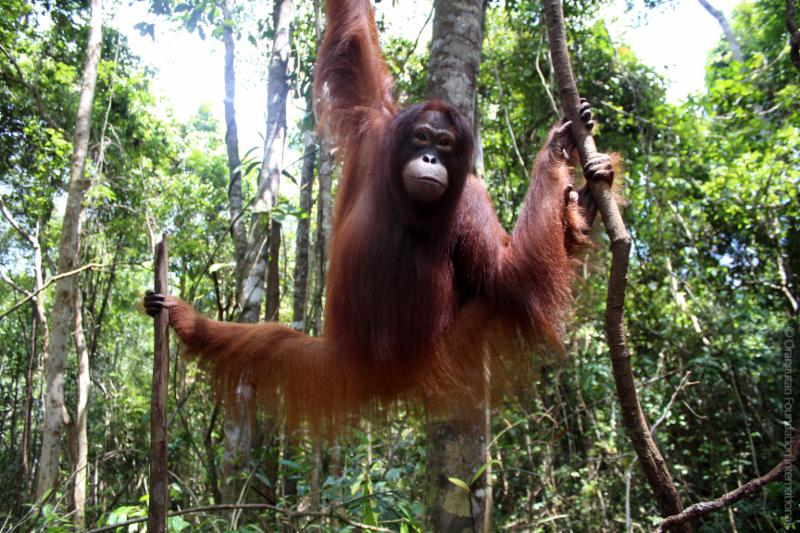 |
|
- - - - - - - - - - - -
IN THIS ISSUE
|
 |

"On a hot afternoon during the rainy season, a vehicle slowly pulled up in the driveway of OFI's Orangutan Care Center and Quarantine (OCCQ) in Central Indonesian Borneo. The van was soon recognized to be a patrol vehicle of the Sampit Wildlife Department of Indonesia. An officer opened up the car to reveal two little orange balls, infants, one of which was Otan. The overwhelmed babies took in their surroundings, experiencing the light, sounds, and smells of life at the Care Center for the first time. OFI was giving these two infants a new chance at life, after they had tragically lost their mothers and spent much of their young lives as pets.
Upon arrival, Otan was slightly underweight but didn't show any signs of further physical injury. After the two orangutan infants were placed into Quarantine, it became clear that Otan had been through some traumatising experiences. Otan's primary caregiver in Quarantine, noted "Otan was extremely shy when he arrived at Quarantine. He would barely move when he saw humans and tried to be 'invisible', rolling himself up into a little ball in the corner of his enclosure." Luckily for Otan, he was in the right hands. His caregivers gave him all the time he needed to adjust to their presence and his new surroundings. They even left a light on for Otan at night, because he was afraid of the dark, loudly crying when he woke up in the darkness after what seemed to be intense nightmares.
After two weeks, Otans' fear of humans greatly dissipated, and his appetite increased proportionality. Otan loves his milk. He would still wake up in the middle of the night, but instead of screaming because of a nightmare, it was now for milk! Otan gained strength every day, and it was soon time for his next challenge. Accompanied by his equally thriving buddy who had arrived with him, Otan left on his first release to conquer the trees of the Learning Forest. Otan first watched his friend climb, and then quickly followed suit. Once Otan's feet left the forest floor, he was unstoppable. Up in the canopy of the young trees, he swung around at the tips of the branches. But this did not all go flawlessly for the first-timer. After a few successful swings, Otan grabbed a branch that was a bit too thin to hold his weight. The branch broke and Otan slid down, landing on the leaf-covered forest floor. Little Otan briefly looked surprised at his miscalculation, but did not hesitate for long before climbing way back up into the trees. ..."
|
|

This once-in-a-lifetime adventure to Indonesian Borneo will give you an opportunity to travel with a small group to intimately experience orangutans in their natural environment.
Last trips of 2017 depart
Oct 30th, 2017 &
Nov 8th, 2017
- - - - - - - - - - - -
|

DONATE

We need you!
OFI is a 501(c)3 charity that relies on our supporters to continue important work protecting wild orangutan populations, rainforests, and wildlife in Indonesia.
|
|
- - - - - - - - - - - -
Our sincerest thanks for being a reader of OFI's Eyes on the Forest newsletter.
Enjoy these stories? Know someone else who would, too?
Share this newsletter with your friends and family!
Y
ou can find out more about OFI & our work at our website:
|
|
|
 |

by Morgan Hannah Pettersson
|
|
|
"In 2015, deliberately lit fires raged across the Indonesian islands of Kalimantan and Sumatra. As the fires grew increasingly out of control and smoke hung heavy and thick over the region, the Indonesian government declared six provinces in the archipelago to be under a state of emergency. One of the six provinces was Central Kalimantan, home to Orangutan Foundation International. OFI staff sprang into action the moment the fires were ignited near our land. Dedicated team members spent four gruelling months, day and night, fighting the forest fires which had already destroyed thousands of hectares of rainforest.
 |
|
 |
Staff desperately fought to save the Orangutan Legacy Forest. |
Staff desperately fought to save the Orangutan Legacy Forest (OLF), an area of primary and secondary rainforest that has gradually been purchased, parcel-by-parcel, and protected by OFI. Sadly, large areas of the OLF were burned. Were it not for the courage and dedication shown by OFI staff, much more of this precious forest would have been lost.
It might surprise you to learn that OFI is still fighting the fires of 2015 today. The flames that burnt bright orange high into the night sky are now extinguished. The smoke that hung heavy over Indonesia and caused many humans and animals to fall ill has dissipated. The charred remains of burnt trees are already being covered with quick-growing green weeds. Though the flames and smoke are long gone, OFI is still fighting these fires. At the OCCQ, the orphaned orangutans who swelled the ranks of the new arrivals after the 2015 fires are still in the earliest phases of the rehabilitation process and adjusting to their new lives without their mothers. Outside the OCCQ, the field staff are still working to protect the remaining trees in the Orangutan Legacy Forest that escaped the flames of 2015.
In the aftermath of the fires, we could finally assess the extent of the damage. With the aid of a drone, OFI was able to capture heartbreaking images of just how much forest was lost. From the ground, the devastation was stark. Only from the air could we finally catch a bird's eye view of just how little forest remained. Prior to the fires, the rainforest in Kalimantan was already disappearing at an alarming rate as more forest is cleared every day to make way for palm oil plantations. Even before the 2015 fires, orangutans were losing their homes and the OCCQ was filled with hundreds of orphans destined for a second chance at living free. Even before the fires, the world could not afford to lose more rainforest in Indonesia.
|
|
| With the aid of a drone, OFI was able to capture heartbreaking images of just how much forest was lost. |
In response to the fires, OFI prepared a determined plan of action for the forest. While purchasing land and instituting patrols had saved much of the forest, OFI now needed to bring back what had been lost, before there was nothing left. The OFI Reforestation Project was launched in December 2015 with the belief that we could succeed, and that we had to.
 |
|
 |
OFI Herbarium |
Dr Galdikas symbolically passed the first handful of seeds to the newly formed Reforestation Team. From there, the momentum for the project grew and a nursery was established at the OFI Herbarium.
Over the next year, the team worked hard to build and maintain the nursery, collect and propagate seeds and seedlings from the nearby remaining forest, and to monitor and patrol the Orangutan Legacy Forest area. That year was one of recovery and catch-up from the hard months of suspending ongoing projects to fight the fires. In 2016, initial planting began.
Then, to ensure maximum learning from this pilot, as well as survival of the trees planted, Dr Galdikas and the Reforestation Team selected April 2017 to launch the full-scale reforestation planting..."
Continue reading.
|
|
by Britt ten Have
"You might have heard that the production of palm oil is very damaging to our global environment and tropical biodiversity. Acres of rainforest are cleared every hour, displacing or killing the many animals who live in them, including the critically endangered Bornean and Sumatran orangutan, Sumatran tiger, and the endangered proboscis monkey. There is another problem with the commercial palm oil industry, and it has a major effect on biodiversity, but fewer people know about it. It is the insidious problem of forest fragmentation.
Huge chunks of rainforest are being converted into palm oil plantations every hour, leaving pieces of rainforest remaining in between them. These rainforest patches are often not connected to each other, but rather separated by acres of plantations. This means that the animals who are living in these pieces are trapped. While these 'refuges' do provide forest shelter, food, nesting sites and other life requirements, the pieces are often small and over-crowded with refugee wildlife, and don't provide the animals with the sufficient habitat needed to survive. In addition, these forest pieces are increasingly exposed to harmful forest 'edge effects' such as wind, sunlight, desiccation and fire.
Wild orangutans living in such fragments are cut off from each other and suffer from increased physiological stress, leading to reduced reproduction and a decline in orangutan populations. Orangutans trapped in small fragments will cross the massive palm oil plantations in search for food or a mating partner. Young orangutan males need to be able to travel over large distances to establish long-term residence in order to more successfully mate or even encounter and monitor receptive females. This might lead to confrontations with humans, in which the orangutan often gets killed. An added danger, the roads built to access the palm oil plantations provide illegal hunters and poachers easy access to the fragmented forest pieces, contributing to a population decline. A 2011 study estimated that about 2,540 orangutans are killed in human-orangutan confrontations each year..."

|
|
| |
|